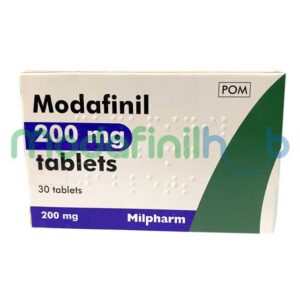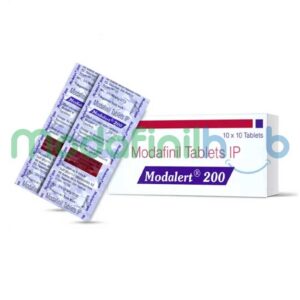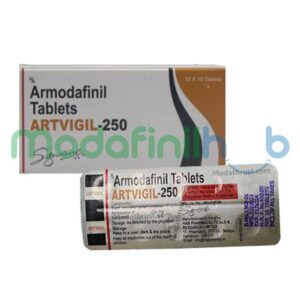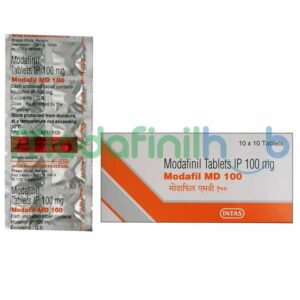Description
Introduction
Nuvigil 150mg is a prescription medication used to improve wakefulness in individuals with excessive sleepiness caused by certain sleep disorders.
It is a type of psychostimulant drug that belongs to the class of eugeroics and is approved by the US FDA for treating conditions such as narcolepsy, shift work sleep disorder, and obstructive sleep apnea. Nuvigil is manufactured by Cephalon Inc. and is available in tablet form.
The medication is taken orally, usually once daily and works by affecting certain chemicals in the brain that are responsible for regulating the sleep-wake cycle.
It is important to note that Nuvigil should only be taken under the supervision of a healthcare provider and following the prescribed dose and duration.
What is Nuvigil 150Mg
Nuvigil 150 mg is a prescription medication used for the treatment of excessive sleepiness caused by various sleep disorders such as narcolepsy, sleep apnea, and shift work sleep disorder.
It is a wakefulness-promoting agent, classified as a eugeroic, that works by increasing the levels of certain neurotransmitters in the brain to help improve wakefulness and reduce the symptoms of excessive sleepiness. Nuvigil 150 mg is taken orally, typically once a day, and is available in tablet form.
How Nuvigil 150Mg Works
Nuvigil 150 mg is a wakefulness-promoting drug that works by increasing the levels of a neurotransmitter called dopamine in the brain.
This helps to improve alertness and reduce feelings of fatigue. The drug works by selectively blocking the action of a naturally occurring compound called histamine in the brain. This leads to an increase in wakefulness, alertness and cognitive function.
Nuvigil 150mg is used to treat excessive sleepiness caused by sleep disorders such as narcolepsy, shift work sleep disorder and obstructive sleep apnea.
Uses of Nuvigil 150 Mg
Nuvigil 150 mg is used to improve wakefulness in patients with excessive sleepiness due to narcolepsy, shift work sleep disorder, and sleep apnea.
It may also be used off-label for other conditions such as depression, attention deficit hyperactivity disorder (ADHD), and cognitive enhancement.
However, it is important to note that its safety and efficacy for these uses have not been established. It is always best to take Nuvigil only as directed by a healthcare professional.
Dosage and Administration
- The recommended starting dose of Nuvigil is 150mg taken once daily in the morning.
- The dose can be increased to a maximum of 250 mg per day, if needed and only after at least 1 week of treatment.
- Nuvigil should be taken orally with water and can be taken with or without food.
- Patients should not exceed the maximum recommended daily dose of 250 mg.
It is important to note that the dosage and frequency of Nuvigil may be adjusted based on the individual patient’s needs and response to treatment. It is recommended to talk to a healthcare provider for a personalized treatment plan.
Side Effects and Precautions
Nuvigil 150mg, like all medications, can cause side effects. Some common side effects of Nuvigil include:
- Headache
- Nausea
- Dizziness
- Insomnia (trouble sleeping)
- Anorexia (loss of appetite)
- Anxiety
- Diarrhea
- Back pain
It is important to note that not everyone experiences these side effects, and many people are able to take Nuvigil without any issues.
However, if you experience serious side effects such as chest pain, irregular heartbeat, signs of an allergic reaction (such as hives, difficulty breathing, or swelling of the face, lips, tongue, or throat), or signs of depression or mood changes, you should contact your healthcare provider immediately.
To reduce the risk of side effects, it is recommended to take Nuvigil exactly as prescribed by your healthcare provider, and not to increase your dose or frequency without first consulting your doctor.
It is also important to inform your healthcare provider about all medications and supplements you are taking, including prescription and over-the-counter drugs, vitamins, and herbal supplements, to avoid potential interactions with Nuvigil.
If you have a history of heart problems, high blood pressure, liver or kidney disease, or mental health conditions, inform your healthcare provider before taking Nuvigil, as these conditions may affect the use of this medication.
If you are pregnant, planning to become pregnant, or breastfeeding, inform your healthcare provider, as Nuvigil may not be safe to use in these situations.
In summary, Nuvigil 150 mg can cause side effects, but many people are able to take it without any issues. To reduce the risk of side effects, take Nuvigil exactly as prescribed by your healthcare provider and inform your doctor about all medications and supplements you are taking.
Interaction with Other Drugs
When taking Nuvigil 150mg, it is important to be aware of potential interactions with other drugs. Some drugs may interact with Nuvigil 150 mg and change how it works, or increase the risk of side effects.
Interactions with Other Drugs: -Central nervous system (CNS) depressants.
Taking Nuvigil 150 mg with these drugs can increase the risk of side effects such as dizziness, drowsiness, and trouble concentrating.
Nuvigil 150 mg may decrease the effectiveness of hormonal contraceptives, increasing the risk of pregnancy. -Acid-reducing drugs : Taking Nuvigil 150 mg with these drugs may decrease the effectiveness of Nuvigil 150 mg.
It is important to inform your healthcare provider about all medications, vitamins, and herbal supplements you are taking before starting Nuvigil 150 mg. They may need to adjust the dose or monitor for any potential interactions.
How to Store Nuvigil 150 Mg
Nuvigil 150 mg should be stored at a temperature between 20°C to 25°C (68°F to 77°F), in a dry place, and away from direct sunlight.
Keep the medication in its original packaging until ready to use, to protect it from light and moisture.
Do not store Nuvigil 150 mg in the bathroom or near a sink.
Do not freeze the medication. Keep Nuvigil 150 mg out of reach of children and pets.
If you no longer need the medication or it has expired, properly dispose of it, following the recommendations of your healthcare provider or local waste disposal company.
Frequently Asked Questions (FAQ)
Q: What is Nuvigil 150 mg used for?
A: Nuvigil 150 mg is used to improve wakefulness in patients with excessive sleepiness caused by sleep disorders such as narcolepsy, sleep apnea, and shift work sleep disorder.
Q: How does Nuvigil 150 mg work?
A: Nuvigil 150 mg works by increasing the levels of certain neurotransmitters in the brain to promote wakefulness.
Q: Who should not take Nuvigil 150 mg?
A: Nuvigil 150 mg is not recommended for individuals with hypersensitivity to armodafinel or modafinel, or with severe liver or kidney problems. Consult your doctor before taking Nuvigil.
Q: How should Nuvigil 150 mg be taken?
A: Nuvigil 150 mg should be taken orally with water once a day, usually in the morning. Dosage may be adjusted by your doctor based on your condition.
Q: How long does it take for Nuvigil 150 mg to start working?
A: The effects of Nuvigil 150 mg may start to be felt within an hour after taking the medication.
Q: How long does Nuvigil 150 mg last?
A: Nuvigil 150 mg can last up to 15 hours.
Q: What are the side effects of Nuvigil 150 mg?
A: Common side effects of Nuvigil 150 mg include headache, nausea, dizziness, anxiety, and trouble sleeping. Report any serious side effects to your doctor.
Q: Can Nuvigil 150 mg be taken with other medications?
A: Nuvigil 150 mg may interact with certain medications. Discuss all medications you are taking with your doctor before taking Nuvigil.
Q: Is Nuvigil 150 mg addictive?
A: Nuvigil 150 mg is not considered to be addictive, but it may cause dependence if used for an extended period.
Q: Can Nuvigil 150 mg be taken while pregnant or breastfeeding?
A: Nuvigil 150 mg is classified as a pregnancy category C drug and its safety in pregnancy is not established. It is also not known if Nuvigil is secreted in breast milk. Consult your doctor before taking Nuvigil if pregnant or breastfeeding.
Q: Can Nuvigil 150 mg cause drowsiness?
A: Nuvigil 150 mg is used to improve wakefulness, but some individuals may experience drowsiness as a side effect.
Q: Can Nuvigil 150 mg be taken with alcohol?
A: It is not recommended to take Nuvigil 150 mg with alcohol as it may increase the risk of side effects and impair judgement.
Q: Can Nuvigil 150 mg be taken with food?
A: Nuvigil 150 mg can be taken with or without food.
Q: What should I do if I miss a dose of Nuvigil 150 mg?
A: If you miss a dose of Nuvigil 150 mg, take it as soon as you remember. Do not take a double dose to make up for a missed dose.
Q: What should I do if I overdose on Nuvigil 150 mg?
A: An overdose of Nuvigil 150 mg can be serious and may lead to symptoms such as agitation, confusion, hallucinations, and rapid heartbeat. Seek immediate medical attention if you suspect an overdose.










